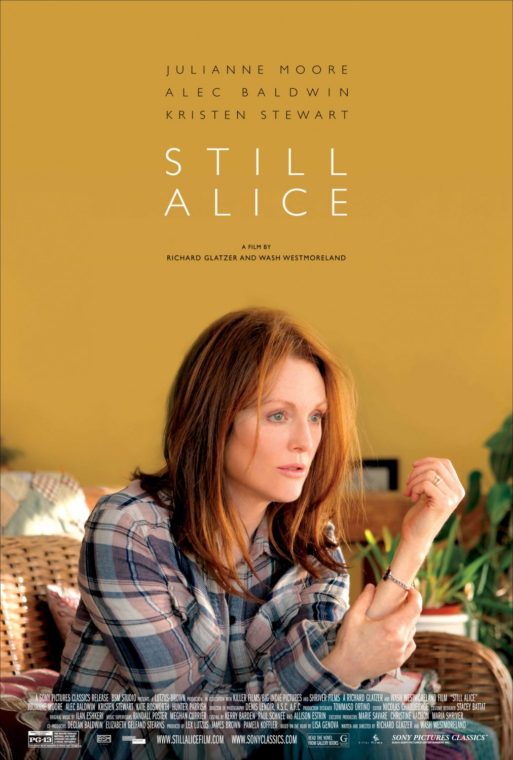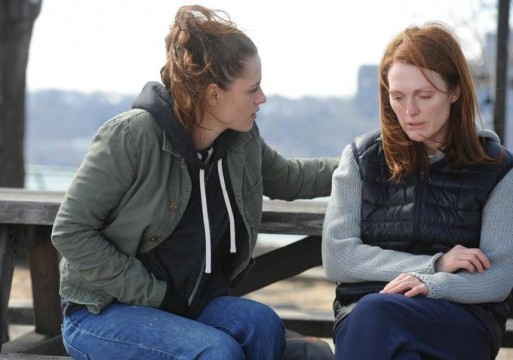 Still Alice is one of those essential movies, an instant classic that has an effect on all of its viewers, regardless of their backgrounds. Alzheimer’s and dementia are growing illnesses that have a growing effect on all of us as life expectancy rates continue to increase. Perhaps this is why, after the credits rolled in the darkened theater in the Fillmore district, the lights raised to a packed audience of men and women with the same devastated looks in their eyes and, for some, tears rolling down their cheeks. But above all, what makes Still Alice unique is that it is a movie focused on life and love, rather than the death that we usually see in movies that are focused on end-of-life ailments.
Still Alice is one of those essential movies, an instant classic that has an effect on all of its viewers, regardless of their backgrounds. Alzheimer’s and dementia are growing illnesses that have a growing effect on all of us as life expectancy rates continue to increase. Perhaps this is why, after the credits rolled in the darkened theater in the Fillmore district, the lights raised to a packed audience of men and women with the same devastated looks in their eyes and, for some, tears rolling down their cheeks. But above all, what makes Still Alice unique is that it is a movie focused on life and love, rather than the death that we usually see in movies that are focused on end-of-life ailments.
Alzheimer’s and dementia are growing illnesses that have a growing effect on all of us as life expectancy rates continue to increase.
In case you’ve been avoiding the Oscar and Golden Globe buzz that has been surrounding this film, Still Alice centers around Dr. Alice Howland (portrayed by Julianne Moore), who is diagnosed with early-onset Alzheimer’s at the young age of 50. The movie opens up at her 50th birthday party in a fancy restaurant, as she celebrates with her family. Knowing what will become of her mental state makes the opening scenes suspenseful to watch. We see Alice as a loving mother and wife, who is an incredibly intelligent professor in fantastic health. Her symptoms are revealed slowly overtime as they would be in life. It starts with a forgotten word from a lecture that she had memorized. Later, she introduces herself to her son’s girlfriend twice over the holidays, and most frighteningly, she gets lost on a jog through her school campus that she should be incredibly familiar with.
Knowing what will become of her mental state makes the opening scenes suspenseful to watch.
As these moments pile on top of each other throughout the movie, viewers are offered an incredibly realistic portrayal of Alzheimer’s that many of us have seen before and others can even relate to. To some extent, we all have memory lapses every now and then, and as we watch Dr. Alice struggle to remember a street address that she was told only a few minutes before, it is incredibly easy to think of our own struggles in much the same way.

Credit: indiewire.com
Still Alice humanizes people with Alzheimer’s in a way that many people have never seen before. As we watch the intelligent linguistics professor slowly lose her vocabulary, and eventually her ability to speak entirely, we are reminded at how quickly we can lose something in ourselves that we cherish.
But we are still human and our experiences and personalities are still our own. And as the movie ends on a note of love as a grainy home movie plays us to the credits, we can see that Alice’s outlook on life, despite the memories that she has lost along the way, is still uniquely her own.
Related SevenPonds Articles:

 Still Alice (2014) by Wash Westmoreland and Richard Glatzer
Still Alice (2014) by Wash Westmoreland and Richard Glatzer


 Forest Bathing Eases Grief by Soaking in Nature
Forest Bathing Eases Grief by Soaking in Nature
 The Spiritual Symbolism of Cardinals
The Spiritual Symbolism of Cardinals
 Meaning-Focused Grief Therapy: Imaginal Dialogues with the Deceased
Meaning-Focused Grief Therapy: Imaginal Dialogues with the Deceased














